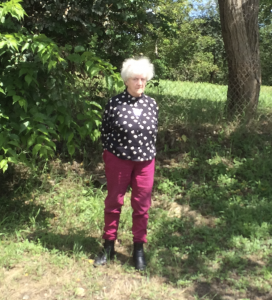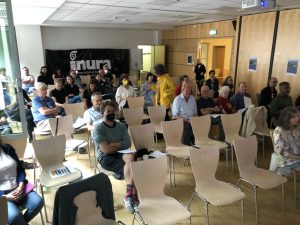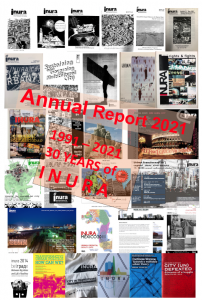News and Comments
In LOVING MEMORY of MARK SAUNDERS
“Urban Political Podcast” dedicates the latest episode to the extraordinary urban filmmaker and tireless social-justice advocate Mark Saunders. Mark passed away on July 5 this year at the age of 68. A week before, Mark joined the INURA conference in Tampere Finland with his great humour and in best health. We all of INURA miss him very much. Listen to Podcast here MarkSaunders_booklet
Foto: Iacopo Zetti
Obituary Louanne Tranchell
Our wonderful member, friend and comrade Louanne Tranchell has passed away January 6, 2025. Please find an obituary here.

INURA Letter of Support for Researchers, Activists and Journalists opposing Lithium Mine in Serbia
INURA_LetterOfSupport_Matkovic
Zurich, September 4, 2024
Open Letter of Support for Aleksandar Matković and those who raise their voices against Rio Tinto and lithium mining
From the International Network for Urban Research and Action (INURA)
INURA is a group of international scholars and experts on social, environ-mental and economic development. Our members come from more than 150 cities and five continents. We wish to express our deep concern regar-ding the situation of Aleksandar Matković, a research associate at the Institute of Economic Sciences in Belgrade, and the other researchers, journalists, and activists who are raising their voices against the contro-versial mining project led by the British-Australian company Rio Tinto.
Matkovic’s critical analysis of plans to mine one of Europe’s largest lithium deposits in Serbia, published in Danas newspaper, has resulted in him being subjected to online surveillance, intimidation, and death threats.
Rio Tinto’s project has sparked widespread public outcry and protests throughout Serbia. Concerns centre on potential ecological devastation in a densely populated agricultural region situated above a significant under-ground water reservoir. According to a scientific study published in a prominent scientific journal, research drilling by the mining company has already caused significant environmental damage, including water conta-mination and elevated levels of toxic substances in rivers and soil, posing serious threats to local communities, their livelihoods, and the surrounding ecosystem. [See: Đorđević, D., Tadić, J.M., Grgur, B., Ristić, R., Sakan, S., Brezjanović, J., Stevanović, V. and Šolaja, B., 2024. The influence of exploration activities of a potential lithium mine to the environment in Western Serbia. Scientific Reports, 14(1), p.17090].
Matković has received increasingly serious death threats via his Telegram profile, including threats referencing personal information not publicly available and made near his actual location, suggesting that he has been followed. Additional threats were directed at him online, indicating pos-sible monitoring of his internet activities.
Despite reporting these threats to the police, no action has been taken. Authorities initially denied awareness of his complaint, but under media scrutiny later admitted that they had received Matković’s complaint and said they would investigate the perpetrators. However, repression has now extended beyond Aleksandar Matković. A foreign journalist intending to cover his case was dissuaded, and alarming raids were made by police and the Security Intelligence Agency on the homes of Matković’s friends and supporters.
Matković’s situation is not an isolated case. Journalists working for media agencies N1, Danas, and NovaS have also raised their voices against Rio Tinto and corrupt activities around the project Jadar and are receiving threats. Moreover, ecological activists (Ne damo Jadar! and other civil associations) have received constant threats and being arrested by the police during the mass protests.
INURA is deeply troubled by the threats facing Aleksandar Matković, his family, friends, and the journalists involved. These incidents represent direct assaults on the fundamental rights of freedom of speech and peaceful assembly. We stand in solidarity with all individuals, media agencies, and civil associations courageously raising valid concerns about the societal impacts and environmental risks associated with Rio Tinto’s massive lithium mining project in Serbia.
Yours sincerely,
INURA
International Network for Urban Research and Action
INURA support Factory Collective ex GKN in Campi Bisenzio, Italy
INURA supports the three year struggle of the Unitary trade union representation, the Factory Collective ex GKN and the female and male workers ex GKN in Campi Bisenzio, Tuscany, Italy
in English as pdf INURA_exGKN(1) or Text below and Film
in Italian in an article by Marvi Maggio, trade union representative, in the magazine PER UN’ALTRA CITTÀ
_________________________________________
Malaga, June 9, 2024
To whom it may concern
The International Network for Urban Research and Action is a
Network of people involved in Action and Research in localities
and cities started in 1991 and formed by researchers and
activists from many different countries, between which many
European ones, Cuba, Australia, Canada, USA, Mexico, Chile,
Hong Kong, China, Japan.
During the INURA Conference in Malaga held on the 3rd – 9
June 2024 the impressive 3 year struggle of the Unitary trade
union representation, the Factory Collective ex GKN and the
female and male workers ex GKN, was presented to us by
Marvi Maggio, a trade union representative. We fully support
the requests and claims of the Collective to the Italian state
and the regional government to make a public intervention for
a reconversion of the factory towards a renewable energy and
light mobility hub in Campi Bisenzio, Tuscany, under the control of the
workers. In this way, the place of work would be preserved
through reconversion.
We admire the practice of the collective that illuminates the
present: solidarity, interconnected struggles, convergence
practice, and the urgent transformation of production from
polluting ones towards ecologic production.
On the basis of our knowledge we support the collective and
encourage all the involved institutions, political and technical to
realize their claims for public intervention for the reconversion
of the factory.
INURA
INURA’s Open Letter – June 2023
Open Letter to the Federal Council of Switzerland concerning Credit Suisse bank’s huge real estate stock being taken over by the largest Swiss bank UBS. The letter was written as a collective effort at 31st INURA Conference Retreat, June 1-4, in Salecina, Canton of Grisons, Switzerland. Read the Open Letter
INURA-Bulletin Nr. 33 out now!
Reflections from the 30th Anniversary Conference of the International Network for Urban Research and Action, INURA, in Luxembourg
INURA Luxembourg continued an old tradition: INURA bulletin Nr. 33 out now !
INURA 2022 – Successfully held

From June 25 to 28 the 30th INURA Conference was held in Luxembourg. More than 60 participants gathered to learn about Luxembourg and to celebrate 30 years and the 30th conference. Read this report Reflecting on research and activism in times of uncertainty and crisis: The 30th Anniversary conference of INURA in Luxembourg | Brennpunkt Drëtt Weltcon: Download 30th_INURA_conference_Luxembourg
INURA Annual Report 2021 _ 30 years of International Research and Action

30th INURA Conference
June 25 – 27, followed by the retreat June 28 – 29 , register here. Early bird registration until April 20.
War in Ukraine – message from Kharkiv
As a INURA member you can submit your own news
By year
- 2025 (2)
- 2024 (2)
- 2023 (2)
- 2022 (4)
- 2021 (2)
- 2020 (1)
- 2019 (1)
- 2018 (2)
- 2017 (1)
- 2016 (7)
- 2015 (6)
- 2014 (1)
- 2013 (2)
- 2012 (1)
- 2011 (3)
- 2010 (2)
- 2008 (1)
By month
- October 2025 (1)
- February 2025 (1)
- September 2024 (1)
- June 2024 (1)
- June 2023 (1)
- February 2023 (1)
- July 2022 (1)
- June 2022 (1)
- April 2022 (1)
- March 2022 (1)
- June 2021 (1)
- January 2021 (1)
- December 2020 (1)
- July 2019 (1)
- July 2018 (1)
- January 2018 (1)
- January 2017 (1)
- December 2016 (1)
- September 2016 (1)
- May 2016 (2)
- March 2016 (1)
- February 2016 (2)
- December 2015 (2)
- October 2015 (1)
- June 2015 (2)
- May 2015 (1)
- January 2014 (1)
- July 2013 (2)
- July 2012 (1)
- November 2011 (2)
- June 2011 (1)
- November 2010 (1)
- September 2010 (1)
- November 2008 (1)

Leave a Reply
You must be logged in to post a comment.